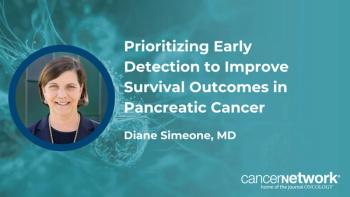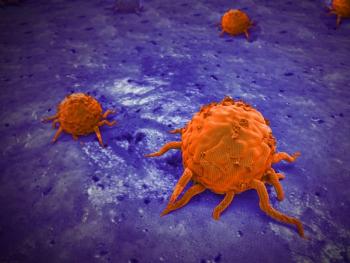
Oncology NEWS International
- Oncology NEWS International Vol 17 No 3
- Volume 17
- Issue 3
Pooled results confirm Len/Dex benefits in myeloma
Multiple myeloma patients receiving lenalidomide (Revlimid) plus dexamethasone had improved responses, longer time to progression, and improved overall survival than those receiving dexamethasone alone in pooled phase III clinical trial results. Donna Weber, MD, of M.D. Anderson Cancer Center, presented the findings at ASH 2007 (abstract 412).
ATLANTA-Multiple myeloma patients receiving lenalidomide (Revlimid) plus dexamethasone had improved responses, longer time to progression, and improved overall survival than those receiving dexamethasone alone in pooled phase III clinical trial results. Donna Weber, MD, of M.D. Anderson Cancer Center, presented the findings at ASH 2007 (abstract 412).
Dr. Weber noted that earlier results from two phase III trials had shown increased activity for myeloma when
lenalidomide was added to dexamethasone. To evaluate time to progression (TTP) and long-term overall survival, investigators pooled the phase III results from trials MM-009 and MM-010.
Included patients (n = 704) had three or more prior therapies and no dexamethasone resistance. They were randomized to lenalidomide 25 mg/d orally on days 1-21 and dexamethasone 40 mg/d orally on days 1-4, 9-12, and 17-20 (Len/Dex) or to the same dexamethasone dose with placebo (days 1-21) (Dex). After four courses, the dexamethasone dose was reduced to days 1-4. Therapy was continued until progressive disease.
The Len/Dex response rate, Dr. Weber said, was excellent at 61% (CR 15%, CR+ near CR [nCR] 24%), compared with 23% for Dex (CR 2%, CR/nCR 3.4%) (P < .001). Median duration of response was 16 months.
Time to progression was significantly longer for Len/Dex patients at a median of 11.2 months vs 4.7 months for Dex (P < .001). Median overall survival was 29.6 months for Len/Dex and 20.5 months for Dex (P < .001).
Dr. Weber said that after interim analyses, unblinding was recommended in both trials, and Dex patients were allowed to crossover to Len/Dex. After crossover, overall survival remained significantly longer for Len/Dex at 35 months vs 31 months (P = .015); 58% of patients remain alive in the Len/Dex group.
Further analysis of pooled data showed that TTP was consistent across age groups. While Len/Dex and Dex TTP and overall survival were generally sustained in patients with more prior therapies, those with prior thalidomide (Thalomid) treatment had a lower overall response rate than thalidomide-nave patients (54% vs 65%). The same pattern prevailed for median TTP (8.3 months vs 13.8 months).
Dr. Weber noted also that Len/Dex responses were sustained regardless of creatinine clearance except when it dropped to below 30 mL/min. Because lenalidomide is excreted renally, and patients with moderate-to-severe renal impairment had more grade 3-4 thrombocytopenia and infection, further trials of dosing in patients with reduced creatinine clearance are needed and planned, she said.
Prior autologous stem cell transplant (AuSCT) did not appear to affect response rates or TTP, although grade 3-4 neutropenia was higher (40.3%) in the prior AuSCT group.
Increased thrombotic episodes were reported in the Dex group for those receiving erythropoietin (8%) vs those not receiving erythropoietin (2%, P = .04). Rates in the Len/Dex group were 15% and 12%, respectively (NS).
Articles in this issue
about 18 years ago
Recentin headed to phase III in first-line colon caabout 18 years ago
Topo 2 alpha test FDA approvedabout 18 years ago
RFA provides sustained pain relief in osteoid osteomaabout 18 years ago
Renal ca surgery often determined by doctors’ practice styleabout 18 years ago
Partial nephrectomy underutilized for small renal tumorsabout 18 years ago
Most older men with early-stage cancer can avoid treatmentabout 18 years ago
SERM reduces ADT side effectsabout 18 years ago
New serum biomarker appears to detect colon cancerabout 18 years ago
Hypofractionated IMRT does not increase sexual side effectsabout 18 years ago
Surface mapping aligns patients for external beam PBINewsletter
Stay up to date on recent advances in the multidisciplinary approach to cancer.



















































